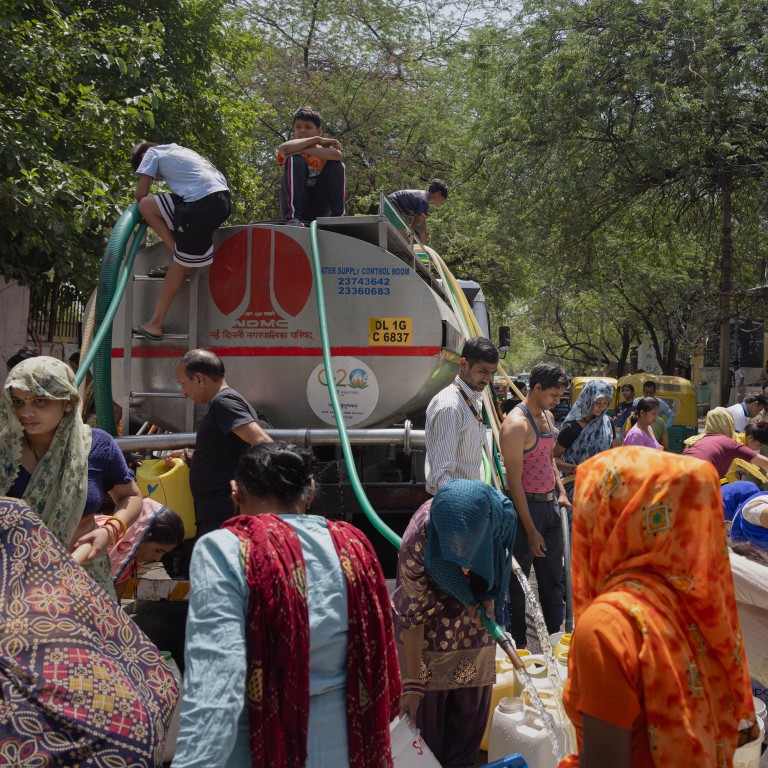
New Delhi’s water crisis spotlights threat to India’s booming economy as climate change takes toll
- Mismanagement to blame for water shortage, as analysts urge authorities to prioritise conservation over development to prevent national crisis
India’s capital, New Delhi is caught in two extremes of a water crisis.
Days after Delhi Water Minister Atishi launched a hunger strike to protest against an acute water shortage due to a heatwave, a sudden downpour flooded the capital’s streets last week and brought an airport roof terminal crashing down.
It was ironic that Atishi, who was hospitalised after her strike, now has her hands full dealing with excess rainwater. As climate change triggers more erratic weather, analysts say Delhi’s plight highlights a key challenge for India’s booming economy – water management.
Months earlier, India’s technology hub Bengaluru was plunged into an unprecedented water shortage crisis. Experts blamed it on rampant construction of houses and building of industries that have stretched the city’s resources.
A report by international ratings agency Moody’s stated late last month: “India is facing a growing water shortage as water consumption increases amid rapid economic growth and increasingly frequent natural disasters due to climate change.”
The severity and frequency of extreme weather events due to climate change would exacerbate the situation because India heavily relied on the monsoon, or the June-September season that brought 70 per cent of the country’s rainfall, the agency warned.
Rising sea temperatures, leading to a narrowing gap with temperatures over land, are weakening the monsoon’s circulation. More cities and towns could follow Bengaluru and Delhi’s crisis unless authorities prioritise water conservation over development, analysts say.

“The water crisis in Delhi and Bengaluru suggests a looming national issue. Rapid urbanisation, inadequate infrastructure, and climate change impact water availability,” said Anjal Prakash, clinical associate professor and research director, Bharti Institute of Public Policy at the Indian School of Business.
“Without timely interventions, more cities could face similar challenges in the future. Sustainable water management, conservation efforts and infrastructure and upgrades are critical to mitigate potential crises, said Prakash, who has contributed to the United Nations’ Intergovernmental Panel on Climate Change’s assessment reports.
India would need a comprehensive approach including investing in water storage and distribution, conservation, efficient irrigation, waste water management, regulations to prevent pollution and improving public awareness, he said. It would require collaboration between the government, industries and the public amid unprecedented heatwaves that are drying up water sources, he added.
Parts of India have been caught in a withering heatwave which has seen temperatures soaring above 40 degrees Celsius (104 degrees Fahrenheit) for weeks, driving the demand for water and electricity to support its 1.4-billion population. Deficient monsoon rains in June compounded the strain on water supplies as farmers plant water-intensive rice crops during the summer.

Analysts say Delhi’s example is a glaring example of water mismanagement, as rainwater harvesting and better drainage could have mitigated the problem. The problem has been compounded by mushrooming of residential flats that hamper groundwater recharge.
The crisis in Bengaluru was triggered by draining out of lakes and scanty rainfall that affected the water flow in the nearby Cauvery River. The city has seen its population triple since the 1990s.
Businesses in both cities faced operational snags as the water crisis disrupted supply chains. The Indian Meteorological Department said seasonal rains were 11 per cent below normal across the country until the end of June, but were expected to pick up this month. As of Wednesday, monsoon rains in India were 4 per cent below normal, the department said.
The costs of heavily water-dependent industries such as textiles and papermaking soared this summer in Bengaluru, with smaller units forced to rely on supplies from water tankers deployed in the city.
‘Things will get worse’
“We have destroyed biodiversity and water bodies and not respected the norm of 25-30 per cent green cover in cities,’ said Harjeet Singh, Delhi-based Global Engagement Director for the Fossil Fuel Non-Proliferation Treaty Initiative. “We don’t have a right model of development and now with climate change, things will get worse.”
Singh said water conservation would need to be jointly tackled by different political parties as it was emerging as a common problem.
The water stress had made clear that future growth should take into consideration ecological measures, environmentalists said.

“Why should the state not look at ecological growth measures such as the quality of rainwater harvesting, soil fertility or forest cover?” said Anil P Joshi, an environmentalist based out of India’s hill state of Uttarakhand.
The northern Indian state planned to release a measure of ecological growth later this year, he said.
Decreases in water supply can disrupt agricultural production and industrial operations, resulting in food inflation and a drop in income that could spark social unrest, according to the Moody’s report. Around half of India’s workforce is dependent on agriculture.
“This in turn can exacerbate volatility in India’s growth and undermine the economy’s ability to withstand shocks,” the agency said.
It highlighted that unusual dryness last August caused a severe water shortage that hit sugar production in the states of Maharashtra and Karnataka, pushing retail sugar prices to a six-year-high. Delhi is expected to keep a close eye on the monsoon this year before deciding whether to relax export curbs on rice.

India’s heavy-industrial users of water such as coal-power generators and steelmakers can face operational disruptions during periods of drought, according to Moody’s.
The development of a nascent sustainable finance market could aid efforts by heavy industrial consumers to improve their water efficiency, the agency said.
Climate experts called on richer nations to aid developing countries like India, which has been investing in water infrastructure and developing renewable energy to cope with a crisis stemming from years of unbridled industrialisation.
“This is where rich nations should help India because at the ambition level India has shown remarkable commitment. We have to work as a global community,” Singh said.

